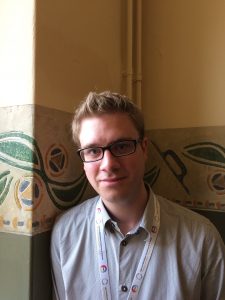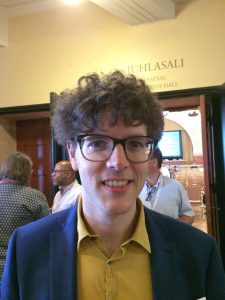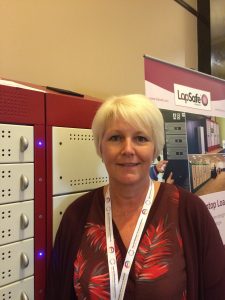1. “People die because of the blocking of OA”
From: Atmire, Belgium
What do you do? We produce the means for content to be open access (OA). We work with software platforms such as DSpace to provide ways of storing standardised open-access data. We work with 130 institutions in 25 countries.
What will happen with OA? Open access will grow. The UK is a leading country in OA, they have a government policy to make everything that is government-funded open access. If University A does research and University B needs it, they need to pay for it. Why? It’s in the government’s interest to make open access happen.
Now the EU also demands that as much as content as possible is open access.
What are the issues facing OA? Publishers, who used to be really needed, now restrict access rather than facilitate it. We need to establish more peer-review groups to act as moderators, so the structure of peer-review needs to be rethought. At the moment, it’s a barrier to OA.
How do researchers themselves feel about OA? They are often afraid of it, rather sceptical. We need more reliable not-for-profit peer reviews.
Why is OA such a hot topic? People die because of the blocking of OA. Think of cancer research. At the moment the system is such that institutions around the world have to choose which journals to buy – no-one can buy them all. If all research was OA people could really come together, come up with new ideas and breakthroughs. But now, especially in developing countries, they are losing out.
2.“Publishers are still needed”
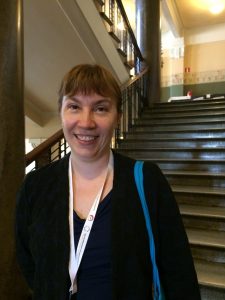 Name: Sandrine Aymard, Senior sales manager
Name: Sandrine Aymard, Senior sales manager
From: Cambridge University Press, UK
Your highlight? Dr Ralf Schimmer from Max Planck Digital Library in Germany. I was very interested to hear about all the figures and facts. I got a very clear picture of what OA is. But what was missing was, “What do we do next?”
What’s the publisher’s point of view? We have to be sure that the quality stays the same for everybody. Schimmer said OA is viable, but is it really, for everyone? Publishers are still needed. It costs money to maintain websites, edit, publish etc. There needs to be an impetus to change the business model.
3. “It was a real eye-opener”
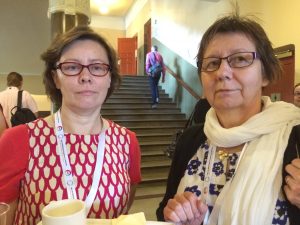 Name: Ulla Ohvo, Library Director
Name: Ulla Ohvo, Library Director
From: Lappeenranta University of Technology, Finland
Your highlight? The data-mining workshop. It’s been great to get on the map, so to speak, with the open data and the open science agenda. I’m particularly interested in the text data mining aspect.
Name: Maaria Harviainen, Senior information specialist
From: Sibelius Academy Library / University of the Arts, Finland
Your highlight? Barbara Ryan’s opening plenary session on the societal benefits of open access and open science. It was a real eye-opener!
Being from an arts-based university I was also really drawn to the way in which she visualised the effects of open access and sharing of data through some stunning images.
4. “Everything works!”
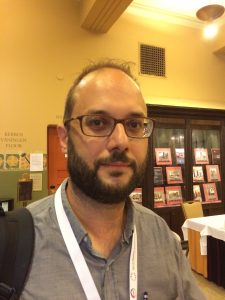 Name: Ioannis Tsakonas, Acting director of the library services, Liber programme committee
Name: Ioannis Tsakonas, Acting director of the library services, Liber programme committee
From: University of Patras, Greece
Your highlight? I’m a member of the Liber conference programme committee and I must say everything! Everything works. And everyone is so friendly and welcoming, it’s been a great experience.
What sessions have you been to? I went to the user-centred design workshop and that was fantastic. Overall, the programme this year is of a very high standard.
*Liber 2017 will be held in Patras.
5. “It’s my first time at Liber”
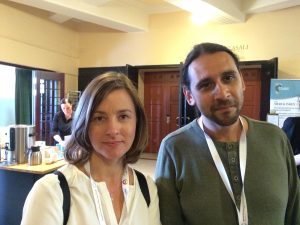 Name: Roman Ganguly, Head of Software Design and Development
Name: Roman Ganguly, Head of Software Design and Development
From: University of Vienna, Austria
What were you expecting from the conference? Tuesday morning there was a LEARN workshop, that was interesting.
It’s my first time at Liber. I’m a computer specialist and interested in the technical infrastructure of OA. So I’m not a librarian, but this year’s theme has been interesting for me and it’s given me an insight into OA from a completely different point of view.
Your highlight? The World Cafe.
Name: Barbara Sanchez-Solis, Manager, Central Library and Archives
From: University of Vienna, Austria
Your highlight? The Workshop on Facilitating Text and Data Mining. There were two researchers from the National Library of the Netherlands and they were fantastic.
6. “I love the nature”
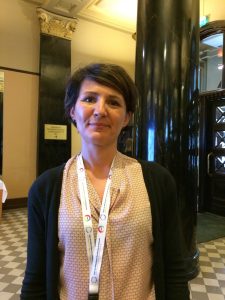 Name: Chrystele Galland-Mabic, Manager, Research Department Services
Name: Chrystele Galland-Mabic, Manager, Research Department Services
From: Université Toulouse Capitole, France
Why are you attending Liber this year? I’m interested in open access. I’m from our university library’s research department services.
What do you think of Helsinki? It’s very calm and I love the nature, the sea and the parklands everywhere.
7. “OA really interests students.”
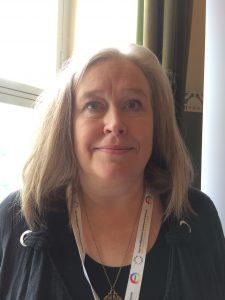 Name: Pälvi Kaiponen, Director of services
Name: Pälvi Kaiponen, Director of services
From: Helsinki University Library, Finland
Your highlight? The SPARC Europe workshop. There was a French researcher who was showing how, with the help of students, they’d been building a research service. Users of the service could check on it how many of your published pieces were open access and how to make them open. It was interesting to see something that was taking advantage of things that had been invented already, not coming up with something new. And doing it with students was a fresh starting point. OA really interests students.
I was also interested to hear from the University of Leiden’s research data management practices, they were very similar to what we do in Helsinki. It was nice to hear that great minds think alike!
8.“OA is now on the minds of managers all over the world”
From: Atmire, Belgium
Why are you here? We’re interested in Open Access. I didn’t go to Liber last year as the theme wasn’t relevant, but this year it’s been great as OA is now on the minds of managers all over the world.
Your highlight? The World Cafe.
What do you think of Helsinki? It’s beautiful, green and calm. In Belgium we’ve had awful weather, lots of rain and snails! So it’s nice to have sunshine.
9. “Not everyone has a computer”
Name: Denise Crouch, Head of sales and marketing
From: Lapsafe, UK
What do you do? We’re Europe’s leading expert in managing storage solutions for laptops and tablets. We manage libraries’ and universities’ self-service-device loans. Our lockers integrate with the library’s security systems.
There are something like 10,000 loans per month. We work worldwide; 45% of UK universities use our services, but we also have clients in Europe, Australia, Africa and the United States.
How does your company contribute to Open Access? We provide the means to access information, the tools for flexible learning. Students can take out laptops and tablets on short-term loans and do research. Not everyone has a computer. Also, public libraries are using our services more and more.
How is Brexit going to affect your work? Our manufacturers and factories are in the UK so we believe in trading with the single market and the free movement of people. We’re the leader in our field so we’re quietly hopeful that things will be fine.
10. “Research has no borders”
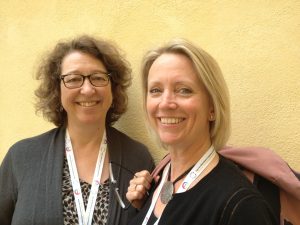
Name: Martha Whitehead, Queen’s University’s Vice-Provost and University Librarian, and Susan Haigh, Executive Director of the Canadian Association of Research Libraries (CARL)
From: Canada
Why are you attending Liber this year?
Martha: We’ve been travelling around Europe in the last week, in the Netherlands, Denmark and now here in Finland at Liber, learning about the overall direction of Europe and the similarities between our countries. It’s a fact-finding mission, trying to gather information about the big initiatives and trends around OA and open science.
Susan: What we’ve been really struck by is the similarities between our institutions and what the Europeans are trying to achieve. There’s a clear relevance to our context.
How different is the approach to OA here in Europe?
Martha: There’s more cohesion in the EU than in Canada. There’s real leadership in initiatives. Libraries here are really on top of the open science agenda.
Susan: The funding opportunities and levels, and the thinking on a policy level, are far ahead of us.
Martha: Yes, and on infrastructure level too. The technical and human capacity are very advanced. And culturally too. The EU has the strategic priorities for 2018-2022 and the emphasis is on the library platform.
What have you taken away from the conference?
Susan: Definitely inspiration and innovation. We look to foster those.
What are your organisations doing to advance OA?
Susan: We’re interested in libraries’ role in research data management. But here, what’s really special is the intersection of digital humanities and cultural research/heritage. We need to try and strengthen it ourselves.
Martha: In Canada we do have OA on the government agenda. The research funding agencies are looking at how to make publications open. But we don’t have a cohesive funding mechanism, we have federal funding, but not like the EU funding.
It’s such a huge undertaking. We need to think about open repositories, new services, interoperability, and it’s international in scope.
Susan: Liber is definitely a validation of our own strategic priorities.
Martha: I would also say to the nay-sayers to OA that economically OA is complex, not difficult. To be open is to be exploring opportunities.
What have been the highlights here at Liber?
Both: Barbara Ryan’s talk on earth observations and importance of open policies. The fact that economically it makes sense that federal institutions aren’t paying for each other’s research but are sharing it, is really a great insight. And she mentioned Canada as well!
Susan: We really liked it, we’ve already learnt from it.
Martha: Yes, research has no borders!
Discover more! Most of the presentation slides can be found by clicking through the full programme on the Liber 2016 website: http://liber2016.org/programme/full-programme/

